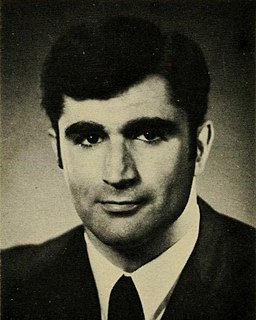Campaign
On October 27, 1977, Massachusetts House minority leader Francis W. Hatch, Jr. became the first Republican candidate for governor. He was joined at his first campaign press conference by former ambassador Henry Cabot Lodge, Jr., former state senator Philip A. Graham, and former state party chairman William A. Barnstead. [20] He believed that the real issues of the campaign were property tax relief, creating jobs and improving the state's economy, welfare reform, revamping auto insurance, and making government more open. [11]
In November 1977, party chairman Gordon Nelson leaked a poll of Republican campaign contributors that showed Richardson was the top choice for governor with 47% followed by Edward F. King with 27%, Hatch with 18%, former governor Francis W. Sargent with 7%, and Middlesex County Sheriff John J. Buckley with 2%. [21]
On January 4, 1978, Edward F. King announced his candidacy for governor. [22] A businessman who founded and ran a data consulting company and a real estate company, King ran as a political outsider. He was best known for leading the successful campaign to defeat the graduated income tax proposals in 1972 and 1976. A conservative, he listed Ronald Reagan and Meldrim Thomson, Jr. as among his heroes. [23] King pledged to cut the state budget by $600 million and eliminate some agencies and programs. [22] He took stances against busing, abortion, gay rights, and gun control. [11] King focused his early campaign on winning the Republican state convention, which he believed would catapult him through the primary and victory over Dukakis in the general election. [23] He pledged to drop out of the race if he did not win the convention vote. [24]
Because Edward F. King had the same name as Democratic candidate Edward J. King, the two candidates were often confused with each other. As the younger and less known candidate, Edward F. King believed that the name confusion worked to his advantage as it gave his name double exposure. Conversely, as the better known candidate, Edward J. King became wary of the confusion. In addition to having the same name, the two Kings also had similar political positions (they both ran as pro-business, anti-tax conservatives) and both attended Boston College (Edward J. King graduated, but Edward F. King left to go into business). Physically, the two were not alike as the Democratic King was large (six-feet tall) and quiet while the Republican was five foot-six and described as "fiery". [23]
On February 6, 1978, John J. Buckley entered the GOP race. Buckley believed that as a fiscal conservative who was liberal on social issues, he was the best Republican candidate to beat Dukakis. He also cited the fact that he had been elected in a heavily Democratic county while King had never run for public office before and Hatch had lost his previous bids for higher office as another reason why he was the best candidate. Buckley reinterated his opposition to the death penalty and promised to veto any attempts to eliminate abortions. He also stated that he wanted to let private businesses perform many state functions, including the Medicaid program. He declined to promise that he would not raise taxes. [25]
The Republican Convention was held on May 6, 1978, at the Symphony Hall in Springfield, Massachusetts. On the first ballot, King received a plurality of the votes with 898 to Hatch's 874 and Buckley's 212. Before the second ballot, Buckley announced that he was withdrawing his candidacy and attempted to move his delegates to Hatch. However, King won the nomination. After the defeat, Hatch announced that he would challenge King in the primary. [26] Although Buckley withdrew at the convention he still considered running in the primary. However, on May 17 he officially exited the governor's race. [27] He later entered the race for the United States House of Representatives seat in Massachusetts's 5th congressional district, which was being vacated by Paul Tsongas.
During the primary campaign, King attacked Hatch for being a "professional politician" and an "insurgent" candidate. He stated as House Minority Leader, Hatch shared a responsibility for higher taxes and spending. King also touted his role as a leader in the taxpayer revolt. Hatch on the other hand ignored King and focused his attack on the Democratic frontrunner and incumbent Governor Michael Dukakis. [11]


















